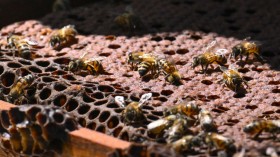As most of the world has energy storage needs, scientists have been looking for ways to improve the manufacturing method of batteries. Researchers from Binghamton University, State University of New York have developed a bacteria-powered battery that could power disposable electronics on a sheet of paper.
"Papertronics have recently emerged as a simple and low-cost way to power disposable point-of-care diagnostic sensors," shared Assistant Professor Seokheun "Sean" Choi, the director of the Bioelectronics and Microsystems Lab at Binghamton and the lead author of the research published in the journal Advanced Materials Technologies.
The new method of manufacturing the battery considerably decreases fabrication time and cost. It also makes great strides in the field of bio-batteries as a power source in resource-limited areas that are also potentially dangerous. "Stand-alone and self-sustained, paper-based, point-of-care devices are essential to providing effective and life-saving treatments in resource-limited settings." said Choi.
Choi and his colleagues placed a ribbon of silver nitrate underneath a thin layer of wax to create a cathode on one half of a piece of chromatography paper. They then fashioned a reservoir out of a conductive polymer on the other half of the paper to act as the anode. With a few drops of bacteria-filled liquid, the battery was powered by the microbes' cellular respiration.
"The device requires layers to include components, such as the anode, cathode and PEM (proton exchange membrane)," explained Choi. "[The final battery] demands manual assembly, and there are potential issues such as misalignment of paper layers and vertical discontinuity between layers, which ultimately decrease power generation."
Though it would take millions of paper batteries to power a common 40-watt light bulb, it could be very useful in a disaster along with other urgent situations. "Among many flexible and integrative paper-based batteries with a large upside, paper-based microbial fuel cell technology is arguably the most underdeveloped," said Choi. "We are excited about this because microorganisms can harvest electrical power from any type of biodegradable source, like wastewater, that is readily available. I believe this type of paper biobattery can be a future power source for papertronics."
© 2024 NatureWorldNews.com All rights reserved. Do not reproduce without permission.





